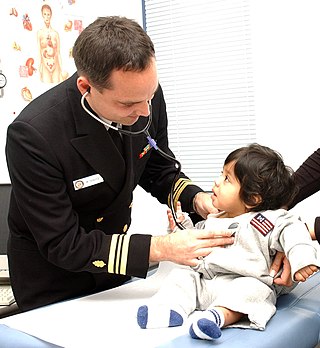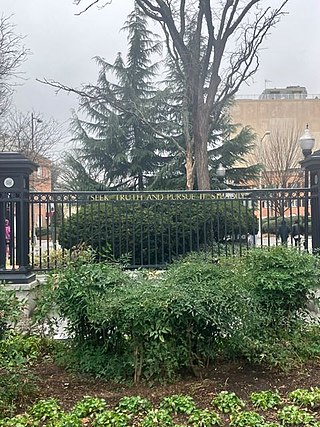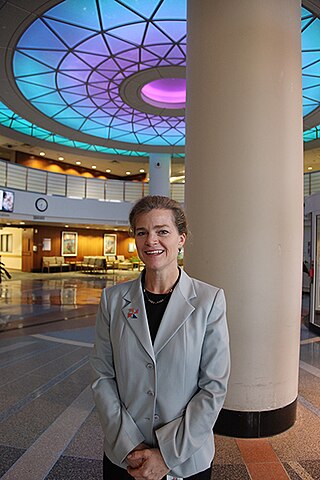Related Research Articles

The University of North Carolina at Greensboro is a public research university in Greensboro, North Carolina. It is part of the University of North Carolina system. Like all members of the UNC system, UNCG is a stand-alone university and awards its own degrees. It is accredited by the Southern Association of Colleges and Schools Commission on Colleges to award baccalaureate, masters, specialist and doctoral degrees. It is classified among "R2: Doctoral Universities – High research activity".
Nurse education consists of the theoretical and practical training provided to nurses with the purpose to prepare them for their duties as nursing care professionals. This education is provided to student nurses by experienced nurses and other medical professionals who have qualified or experienced for educational tasks, traditionally in Nursing schools. Most countries offer nurse education courses that can be relevant to general nursing or to specialized areas including mental health nursing, pediatric nursing and post-operatory nursing. Courses leading to autonomous registration as a nurse typically last four years. Nurse education also provides post-qualification courses in specialist subjects within nursing.
A nurse educator is a nurse who teaches and prepares licensed practical nurses (LPN) and registered nurses (RN) for entry into practice positions. They can also teach in various patient care settings to provide continuing education to licensed nursing staff. Nurse Educators teach in graduate programs at Master's and doctoral level which prepare advanced practice nurses, nurse educators, nurse administrators, nurse researchers, and leaders in complex healthcare and educational organizations.
Home health nursing is a nursing specialty in which nurses provide multidimensional home care to patients of all ages. Home health care is a cost efficient way to deliver quality care in the convenience of the client's home. Home health nurses create care plans to achieve goals based on the client's diagnosis. These plans can include preventive, therapeutic, and rehabilitative actions. Home health nurses also supervise certified nursing assistants. The professional nursing organization for home health nurses is the Home Healthcare Nurses Association (HHNA). Home health care is intended for clients that are well enough to be discharged home, but still require skilled nursing personnel to assess, initiate and oversee nursing interventions.

Woody Lombardi Durham was an American play-by-play radio announcer for the North Carolina Tar Heels football and men’s basketball programs from 1971 to 2011.
Beverly Louise Malone is the chief executive officer of the National League for Nursing in the United States. Prior to assuming this position in February 2007 she served as general secretary of the Royal College of Nursing in the United Kingdom for six years.
The National League for Nursing (NLN) is a national organization for faculty nurses and leaders in nurse education. It offers faculty development, networking opportunities, testing services, nursing research grants, and public policy initiatives to more than 40,000 individual and 1,200 education and associate members.

Georgetown UniversitySchool of Nursing is one of the eleven schools of Georgetown University. Founded in 1903 as the School of Nursing, it added three other health related majors in 1999 and appended its name to become the School of Nursing & Health Studies. In 2022, the school returned to the name School of Nursing, as the School of Health was divided from it. The school has been at the forefront of education in the health care field, offering many programs unique to America's elite institutions. Offering undergraduate and graduate programs in the health sciences, graduates are prepared to enter the complex fields of medicine, law, health policy, and nursing. The School of Nursing is made up of the Department of Health Systems Administration, the Department of Human Science, the Department of International Health, and the Department of Nursing.

A family nurse practitioner (FNP) provides continuing and comprehensive healthcare for the individual and family across all ages, genders, diseases, and body systems. Primary care emphasizes the holistic nature of health and it is based on knowledge of the patient in the context of the family and the community, emphasizing disease prevention and health promotion.
Second Life is used as a platform for education by many institutions, such as colleges, universities, libraries and government entities.

Eugene Weston Hobbs II, known as Gene Hobbs is an American technical diver and founding board member of the non-profit Rubicon Foundation. Hobbs has served as medical officer for the Woodville Karst Plain Project since 2004 and was named the 2010 Divers Alert Network/ Rolex Diver of the year. Hobbs was a hyperbaric technologist and simulation coordinator at Duke Medical Center before taking a position as the Director of Simulation for the University of North Carolina School of Medicine and Clinical Instructor in the Department of Pediatrics. As of 2018, Hobbs is the business manager for the UNC Health Care Department of Neurosurgery.

Friday Night at the ER is an experiential team-learning game. Played on game boards at tables with four players per board, each gameplay session is followed by a detailed debriefing in which participants relate the simulation experience to their own work and gain insights for performance improvement.

The George Washington University School of Nursing is the professional nursing school of the George Washington University, in Washington, D.C. Founded in 2010, GW Nursing is the newest of the 10 schools and colleges of George Washington University.

Julie Story Byerley is an American physician who is known as a leader in the fields of medical education and pediatrics. Byerley has served as a clinical professor and Vice Dean for Education for the University of North Carolina at Chapel Hill School of Medicine. She currently serves as President and Dean of Geisinger Commonwealth School of Medicine as well as Executive Vice President and Chief Academic Officer for Geisinger Health System.

The Society for Simulation in Healthcare (SSH), formerly known as the Society for Medical Simulation is a non-profit organization founded in 2004 to advance the application of medical simulation in healthcare. It serves as a resource for young professionals in their growth in medical education and administration.
Suzanne Gordon is an American journalist and author who writes about healthcare delivery and health care systems and patient safety and nursing. Gordon coined the term "Team Intelligence," to describe the constellation of skills and knowledge needed to build the kind of teams upon which patient safety depends. Her work includes, First Do Less Harm: Confronting the Inconvenient Problems of Patient Safety, a collection of essays edited with Ross Koppel and Beyond the Checklist: What Else Health Care Can Learn from Aviation Safety and Teamwork, written with commercial pilot Patrick Mendenhall and medical educator Bonnie Blair O’Connor, with a foreword by Captain Chesley "Sully" Sullenberger.
Mary Lee Mills was an American nurse. Born into a family of eleven children, she attended the Lincoln Hospital School of Nursing and graduated in a nursing degree and became a registered nurse. After working as a midwife, she joined the United States Public Health Service (USPHS) in 1946 and served as their chief nursing officer of Liberia, working to hold some of their first campaigns in public health education. Mills later worked in Lebanon and established the country's first nursing school, and helped to combat treatable diseases. She was later assigned to South Vietnam, Cambodia and Chad to provide medical education.
Pamela R. Jeffries is an American professor of nursing and serves as dean of Vanderbilt University School of Nursing. She is nationally recognized as an expert in nursing, with a focus on simulation and education.
Dorrie K. Fontaine is an American educator, author, dean, and critical care nurse. She is known best for her academic leadership at the University of Virginia School of Nursing.
Mary Ellen Smith Glasgow is an American nurse, academic, author and researcher. She is a dean of school of nursing, vice provost for research and a professor at Duquesne University.
References
- 1 2 3 4 5 6 7 8 9 Durham, Carol F. "Durham CV" . Retrieved 2017-04-13.
{{cite journal}}: Cite journal requires|journal=(help) - 1 2 "CERC: Clinical Education & Resource Center". Carolina Nursing Magazine. 2006.
- ↑ "Carol F Durham". Medical Training Magazine. 2017.
- ↑ Oermann, Marilyn. "Carol Durham Shares Views about Simulation and Nurse Educator as Leader". Nurse Educator Online.
- ↑ "QSEN Faculty". Quality and Safety Education for Nurses Project. Archived from the original on 2017-04-14. Retrieved 2017-04-13.
- ↑ "Infusing Quality and Safety Education for Nurses into Your Curriculum: A Workshop Funded by a grant from The Agency for Healthcare Research and Quality". 2017-03-22.
{{cite journal}}: Cite journal requires|journal=(help) - 1 2 "NLN and INACSL Publish Vision for Debriefing Across the Curriculum". 2016-06-09.
- ↑ "NCSBN invites Carol Durham to join simulation task force". UNC School of Nursing. 2015-04-13.
- ↑ "C.I.P.E. Faculty Development Institute". NC AHEC. Archived from the original on 2017-04-13. Retrieved 2017-04-13.
- 1 2 Brewer E, Rost E, Cozart R, Davidson G, Durham C, Hobbs GW, Joyner BL, Scolaro KL. (2016-02-05). "A Veteran and His Dog". Association of American Veterinary Medical Colleges (AAVMC)/ Association for Prevention Teaching and Research (APTR) One Health Interprofessional Education Initiative. One Health Scholar Project.
{{cite journal}}: CS1 maint: multiple names: authors list (link) - ↑ Lopreiato J O (Ed.), Downing D, Gammon W, Lioce L, Sittner B, Slot V, Spain AE (Assoc. Eds.), and the Terminology & Concepts Working Group. (2016). "Healthcare Simulation Dictionary. Rockville, MD: Agency for Healthcare Research and Quality; October 2016. AHRQ Publication No. 16(17)-0043" (PDF).
{{cite journal}}: Cite journal requires|journal=(help)CS1 maint: multiple names: authors list (link) - ↑ "Global Network for Simulation in Healthcare (GNSH) 2016 SUMMIT" (PDF). 2016. Archived from the original (PDF) on 2017-04-13. Retrieved 2017-04-13.
{{cite journal}}: Cite journal requires|journal=(help) - 1 2 Read, Zach. "Sepsis Survivor". UNC Health Care.
- ↑ "Third Annual Step-On-Sepsis™ 5K Event on May 7th Recognized by state of North Carolina as "Sepsis Awareness Day"". BioMérieux. 2016-05-02.
- ↑ staff (2017-03-30). "Biomerieux plant in Durham only one that produces sepsis blood culture bottle (+ video)". WRAL-TV.
- ↑ "Durham testimony at bioMérieux opening". UNC School of Nursing. 2017-04-07. Archived from the original on 2017-04-13. Retrieved 2017-04-13.
- ↑ "NCNA Nurse Educator of the Year Press Release". NC Nursing Association. Archived from the original on 2013-02-28. Retrieved 2017-04-13.
- 1 2 "Carol Fowler Durham". UNC School of Nursing.
- ↑ "About the Fellows". National League for Nursing.
- ↑ "Faculty member Carol Durham to be inducted into NLN Academy". Carolina Nursing News. 2009-06-19. Archived from the original on 2016-06-17. Retrieved 2017-04-13.
- ↑ "History of the SIRC". National League for Nursing.
- ↑ "SON Awards Laurel Archer Copp Literary Award". Carolina Nursing News. 2009-09-15. Archived from the original on 2016-06-16. Retrieved 2017-04-13.
- ↑ "Award Winners". Drexel University.
- ↑ Tate, Teresa Killian (2010-10-15). "Alumni honored for achievements, service". Western Carolina University.
- ↑ "WCU honors Carol Fowler Durham". Western Carolina University. 2011-03-16.
{{cite journal}}: Cite journal requires|journal=(help) - ↑ "Durham receives SSH Presidential Citation". UNCsim. 2017-02-01.